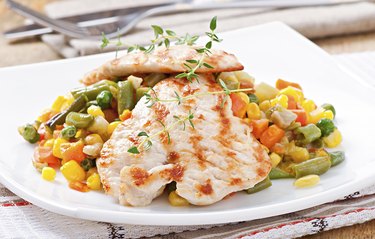
Baked chicken breast nutrition changes based on the ingredients used to prepare it. If you don't load it down with butter or coat it with breadcrumbs to make a crust, you'll end up with a healthier protein. Adding flavor with spices barely changes the baked chicken breast calories.
Baked Chicken Breast Nutrition
Video of the Day
According to the USDA, the nutrition information and baked chicken breast calories of 100 grams of chicken breast coated, prepared skinless, made without fat, when the coating is not eaten, is the following:
Video of the Day
- 165 calories
- 31 grams protein
- 4 grams of fat
- 0 grams carbohydrates
- 0 grams fiber
- 0 grams sugar
- 7 milligrams of calcium
- 29 milligrams magnesium
- 237 milligrams phosphorus
- 378 milligrams potassium
- 507 milligrams of sodium
The USDA provides the following data for 100 grams of raw boneless skinless chicken breast:
- 120 calories
- 23 grams of protein
- 3 grams of fat
- 0 grams carbohydrates
- 0 grams fiber
- 0 grams sugar
- 5 milligrams of calcium
- 28 milligrams magnesium
- 213 milligrams phosphorus
- 334 milligrams potassium
- 45 milligrams of sodium
It's not the baking process that adds sodium, but the seasonings used to flavor the chicken before baking it. If the sodium aspect of baked chicken breast nutrition is an issue because you're supposed to be on a low-sodium diet, opt for salt-free seasoning blends.
Remember, your cooking method affects the overall baked chicken nutrition. Baked chicken breast calories are going to be lower than fried chicken breast because of the oil the chicken soaks in during the cooking process. The healthiest cooking methods are baked, broiled, grilled or steamed.
Read more: How to Bake a Plain Chicken Breast
Health Benefits of Chicken Breast
As a good source of lean protein, chicken breast offers a number of health benefits. According to Harvard Health Publishing, adults need a minimum of 0.8 grams of protein for every kilogram of body weight, or .36 grams for every pound. This amounts to a little over 7 grams for every 20 pounds of body weight. A 140-pound person needs approximately 50 grams of protein a day.
A single serving of baked boneless skinless chicken breast takes care of almost half of your daily protein needs, as it contains 23 grams of protein without any added ingredients.
An April 2015 meta-analysis of multiple studies published in The American Journal of Clinical Nutrition showed a high-protein diet that contains anywhere from 1.2 to 1.6 grams of protein for every kilogram of body weight helped increase satiety, suppress the appetite, improved weight loss and increased fat loss.
According to Harvard T.H. Chan School of Public Health, their research shows replacing red processed meat with healthy protein sources such as poultry, fish and beans reduces the risk of heart disease and stroke. This is because the different types of fat that are present in red meat, as they contain higher amounts of saturated fats that contribute to high cholesterol.
Chicken Thighs or Breasts?
Which is healthier, chicken thighs or chicken breasts? Both are available without skin and bone, so does it really matter which one you eat? The breast is white meat, while the thighs are dark. Chicken thighs also tend to be cheaper than breasts.
According to the Academy of Nutrition and Dietetics, both chicken thighs and chicken breasts are a good source of lean protein, but thighs are higher in calories and fat. A 3-ounce portion of boneless, skinless chicken thigh contains three times the amount of fat (9 total grams of fat with 3 grams of saturated fat) and 30 more calories compared to the same amount of chicken breast.
If you can't live without your dark meat, opt for dark turkey meat, which is lower in fat and has fewer calories than a chicken thigh. A 3-ounce portion of dark turkey meat contains about 134 calories, and only 5 grams of total fat, and 1.5 grams of saturated fat.
- U.S. Department of Agriculture FoodData Central: "Chicken Breast, Coated, Baked or Fried, Prepared Skinless, Coating Not Eaten, Made Without Fat"
- U.S. Department of Agriculture FoodData Central: "Chicken, Broiler or Fryers, Breast, Skinless, Boneless, Meat Only, Raw"
- Harvard Health Publishing: "How Much Protein Do You Need Every Day?"
- The American Journal of Clinical Nutrition: "The Role of Protein in Weight Loss and Maintenance"
- Harvard T.H. Chan School of Public Health: "Protein"
- Academy of Nutrition and Dietetics: "Chicken Breasts vs. Thighs: Which Is More Nutritious?"
Was this article helpful?
150 Characters Max
0/150
Thank you for sharing!
Thank you for your feedback!